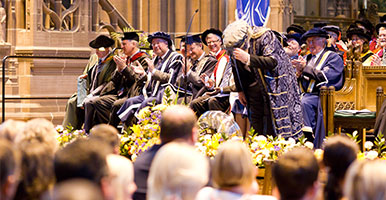Dame Philippa Russell
Presented by Sir Bert Massie
Chancellor, Vice-Chancellor, honoured guests, graduands…
The highest honour that Liverpool John Moores University can confer is that of Honorary Fellow. The award is reserved for people who have made an exceptional contribution and impact in a field of human endeavour. Dame Philippa Russell DBE is such a person and we are proud to welcome her today.
Philippa was born in Sheffield but spent her childhood in Cumbria and later graduated from St Hilda’s College, Oxford, with a degree in Modern History. Philippa and her husband, Alan, have three children. The first born, Simon, was born with significant learning disabilities and throughout his life Philippa has supported him. This has given her a deep insight to the strengths and weaknesses of the services we offer people with learning disabilities and this has been reflected in her work.
Her early adult life was spent overseas as Alan was in the diplomatic service. Learning of the ways in which different types of government operate was to give her skills she would use most effectively later in life.
In the mid 1970s she became Director of the Council for Disabled Children which, although part of the National Children’s Bureau, was the forum that brought together the major national organisations concerned with the needs of children with physical or intellectual impairments. She remained in that post for over 25 years. Under her inspired leadership the Council became a leading advocate for improved service. Its recommendations might well have had emotional attraction but what made them policy material was the detailed research that underpinned them. It was Philippa who drew together the material, ordered it, and presented it with such clarity that the conclusions were inescapable. When in 1981 the Government passed the Special Educational Needs Act, which resulted in significant improvements in education provision for disabled people, Philippa was the key person from whom the Government accepted advice. The success of that Act of Parliament is largely due to her contribution.
In 1978 she published her book The Wheelchair Child. This book illustrated how with the right support. children in wheelchairs could have a good life. It was awarded the Odd Fellow Prize and was translated into eight languages. It rightly gave Philippa a world wide reputation. It is still available and I note an American bookshop is currently offering a copy for sale for a mere $1,400.
Philippa has written a number of books and more articles than I can list today but her output has been voluminous and influential.
The 1980s and early 1990s were tumultuous years for disabled people as the Government resisted attempts to introduce civil rights legislation. Philippa was at the heart of that battle; ensuring disabled children were never overlooked. At a time when such views were seen as outside the mainstream, she championed enabling disabled children with high care needs to attend local schools rather than residential special schools. When she suggested a new approach she was told time and again that it was impossible. It later became official policy. More than anyone she promoted the rights of people with learning disabilities.
Government and others increasingly sought her expertise. As a member of the Disability Rights Task Force in the late 90’s she helped set the agenda on disability rights for the next decade. In 2000 she was appointed as a Commissioner of the new Disability Rights Commission where she made a critical contribution.
Her experience as a carer has given her a valuable insight into how poor is the support carers receive. In 2007 she was appointed as chair of the Prime Minister’s Standing Commission on Carers. When she received a phone call inviting her to assume this duty the call came not from a civil servant or even a minister. At the end of the phone was the then Prime Minister, Gordon Brown. Such is the respect in which she is held.
Her impact is unquestionable but she is more than her output. She brings to every issue more than knowledge and an analytical mind. She also brings humanity, perseverance, common sense and humour. A private woman, she is always the first to enquire about other people. Philippa also has a knack for taking on tasks in a quiet discrete way. Many blind people have been grateful to Philippa who would use a break in a meeting to take their guide dogs for a walk. I think the dogs were also rather grateful.
Today Philippa is a trustee of a number of charities. She continues providing support for her son, Simon, sometimes in unusual ways. They were recently in Italy and Simon found a rock he liked. He wrapped it in paper to bring it home but the airport scanner machines staff thought it was suspicious and Simon was soon surrounded by security staff. He refused to hand it over and was then surrounded by people pointing guns at him. It was only when Philippa said loudly “Austistico” that the staff realised the true situation, lowered their guns and started smiling!
Philippa has never sought recognition but it has found her. Her awards include the Rose Fitzgerald Kennedy International Award for women who have contributed to the field of learning disability. She is an Honorary Fellow of the Royal College of Paediatrics and Child Health. She has a number of honorary doctorates. She was appointed an OBE, later upgraded to a CBE, and in 2009 she was appointed a Dame Commander of the Most Excellent Order of the British Empire. She has been given Lifetime Achievement Awards for her work in furthering the civil and human rights of disabled people.
Thus it is with great personal pleasure that I present Dame Philippa Russell for admission to our highest honour as Honorary Fellow of Liverpool John Moores University.



